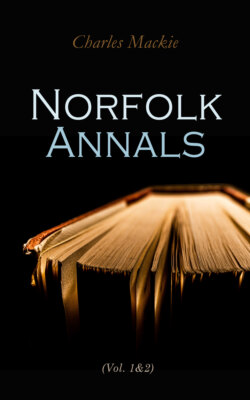Читать книгу Norfolk Annals (Vol. 1&2) - Charles Mackie - Страница 300
На сайте Литреса книга снята с продажи.
OCTOBER.
Оглавление4.—A shooting match between Mr. William Coke and Lord Kennedy for 200 sovereigns a side, play or pay, “who shoots and bags the greatest number of partridges in two days’ sport on September 26th and October 4th,” was decided. Mr. Coke shot over his uncle’s manors in Norfolk, and Lord Kennedy over Sir William Maxwell’s lands at Monteith. Mr. Coke on the first day bagged 80½ brace, and on the second day 90 brace. Lord Kennedy on the first day killed 50 brace, and on the second day 82 brace.
11.—William Burton Peeling, a prisoner in Swaffham gaol, was endeavouring to hold a conversation with another prisoner in the adjoining division of the tread-mill, when he accidentally placed his head in the wheel, which drew him in and crushed him to death.
17.—The 8th King’s Royal Irish Hussars, commanded by Lieut.-Col. Westenra, were inspected at Norwich by Lord Edward Somerset, Inspector-General of Cavalry.
18.*—“Mr. Bellamy, well known as a favourite actor on the Norwich boards and late manager of the Theatre, is about to resume his professional career at Bath after a short retirement from the stage.”
22.—The first annual meeting of the Norfolk and Norwich Literary Institution was held in the society’s rooms in the Haymarket, Norwich, Lieut.-Col. Harvey, the president, in the chair.
25.*—“In consequence of directions given at the end of last year by the Hon. Fulke Greville Howard, one of the members for the most antient borough of Castle Rising, and who is also lord of the manor, the rubbish which had accumulated for ages in the great hall, where the court leet is held in the inward part of the castle or keep, having been cleared away, the bases of two pillars, which apparently supported an arch, were discovered, and likewise a well between these columns, 63 feet deep, in a very perfect state. Many hundred cart loads of the ruins which had fallen in from above were removed before these interesting remains were laid open to view.”
26.—Died, Dr. W. B. Carter, assistant surgeon in the 8th King’s Royal Irish Hussars, whose remains were buried with military honours at St. Peter Mancroft church, Norwich, on the 30th. The grave was dug at the lower extremity of the middle aisle, and the customary volleys were fired by a party of hussars stationed in the roadway between the great west door of the church and the entrance to the Swan Inn.
27.—The Norwich Pantheon was opened under the management of Mr. Kinloch, with his company from the Royal Amphitheatre, London. “A real fox chase, with dogs, horses, fox, and hounds,” was the principal attraction.
31.—By virtue of a writ of mandamus granted by the Court of King’s Bench, the Norwich Court of Quarter Sessions was compelled to hear the appeal “the Churchwardens and Overseers of the Poor of the Hamlet of Lakenham, appellants, v. the Governor, Deputy-Governor, and others of the Court of Guardians of the City of Norwich, respondents.” The appellants contended that the assessment made upon stock was not in accordance with the Act of Parliament, by virtue whereof the rate for the maintenance of the poor of Norwich was raised, and was unfair and inequitable. It was stated in the course of the trial that the real estate of the city was valued at £54,041, that of the hamlets at £15,028; the personal property in the former was estimated at £99,800, and in the latter at £5,700. The court confirmed the certificate, and dismissed the appeal.
—One of the most violent storms ever remembered occurred on this date, and resulted in many disasters on sea and land. The whole of the coast of Norfolk was strewn with wrecks, many lives were lost, and much misery prevailed. At Cromer the brig, Duchess of Cumberland, came ashore near the lighthouse, and notwithstanding the brave exertions of Mr. Buxton, Mr. Samuel Hoare, Mr. William Lukin, Mr. Windham, and other gentlemen, to effect their rescue the crew of sixteen perished. Among the most remarkable of the incidents on land was the subsidence of a cottage at Corpusty. The occupier, Robert Faircloth, and two women felt the house in motion, rushed out, and a few seconds afterwards “saw it sink out of sight into the bowels of the earth, leaving a vacuum of several feet deep above it which presently filled with water.”
